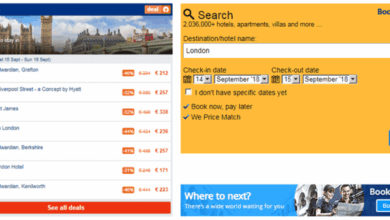Trivago hotels hidden fees comparison unveiled

Delving into Trivago hotels hidden fees comparison, travelers often find themselves navigating a maze of unexpected costs that can significantly impact their overall experience. Trivago serves as a vital tool in the hotel booking landscape, aggregating a wealth of hotel information to help users find the best deals. However, an essential aspect often overlooked is the hidden fees that can inflate the price of a stay.
Understanding these charges is crucial for making informed decisions and can save you money and frustration during your travels.
From resort fees to wifi charges, hidden fees have become a common pain point for many travelers. By detailing the most prevalent hidden costs, this guide aims to equip you with the knowledge to spot these charges before booking. With a comprehensive comparison table highlighting differences among various hotel chains, you’ll gain a clearer picture of what to expect when it comes to additional costs.
Introduction to Trivago and Hidden Fees
Trivago has revolutionized the hotel booking experience by serving as a powerful platform that aggregates hotel information from various booking sites. Users can effortlessly compare prices and find accommodations that meet their preferences and budget. However, while Trivago simplifies the search process, navigating through hidden fees can complicate the final pricing of hotel stays, making it essential for travelers to be aware of these charges.Understanding hidden fees is crucial for anyone looking to secure the best deal when booking hotels.
These fees can substantially increase the total cost of a stay and often catch travelers off guard if they are not properly informed. By knowing what to look for, travelers can make more informed decisions, ensuring that the hotel choice aligns with their financial expectations.
Common Types of Hidden Fees
Numerous hidden fees can affect the overall cost of hotel bookings. Being aware of these fees can help travelers budget more accurately and avoid unpleasant surprises. Below are some of the most common types of hidden fees associated with hotel stays:
- Resort Fees: Many hotels, particularly in tourist areas, charge a daily resort fee. This fee often covers amenities like pool access, Wi-Fi, and gym facilities, but it may not be included in the initial price displayed on booking sites.
- Parking Fees: While some hotels provide complimentary parking, others impose significant charges for guests using their parking facilities. This can be particularly common in urban areas where space is limited.
- Wi-Fi Charges: Although many hotels offer free Wi-Fi, others may charge guests for access, especially in locations that prioritize business travelers.
- Early Check-in or Late Check-out Fees: Some hotels may charge additional fees for guests wishing to check in before standard hours or check out after the usual time.
- Room Service and Minibar Charges: Costs for room service and items from the minibar can accumulate quickly, often catching travelers off guard if they are not aware of the pricing beforehand.
Understanding these hidden fees can significantly impact the overall travel budget, allowing for more accurate financial planning during trips.
Common Hidden Fees in Hotel Bookings
When booking a hotel, many travelers are often blindsided by additional costs that significantly inflate their total expenses. These hidden fees can vary widely depending on the hotel chain, location, and the services provided. Understanding these potential charges helps travelers make informed decisions when planning their stays.Hidden fees in hotel bookings may seem minor at first glance, but they can accumulate to a substantial amount, affecting the overall budget of a trip.
While some fees are for services that travelers may find beneficial, others may feel excessive or unnecessary. Knowing what to look for can save guests from unexpected financial surprises during their stay.
Prevalent Hidden Fees and Charges
Travelers should be aware of several common hidden fees that might appear on their bills. These fees often pertain to amenities or services that are not included in the initial booking price. Below are some typical fees that guests can encounter:
- Resort Fees: Many hotels, especially in tourist-heavy areas, charge resort fees that cover amenities like pool access, fitness centers, and Wi-Fi. These can range from $15 to $50 per night.
- Parking Fees: Depending on the location, hotels may charge for parking, which can add $10 to $60 per day, particularly in city centers.
- Internet Fees: While some hotels offer free Wi-Fi, others charge daily fees, which can be around $10 to $20, for access to high-speed internet.
- Mini-Bar and Snack Charges: Consuming items from a mini-bar or in-room snacks can lead to charges that are often significantly marked up, with items costing two to three times their retail value.
- Early Check-In/Late Check-Out Fees: Hotels may charge if guests wish to check in before or check out after standard times, typically around $20 to $50 extra.
- Housekeeping Tips: Some hotels suggest a daily tip for housekeeping, which can be an additional $1 to $5 per day, adding to the overall cost if not budgeted.
The following table illustrates a comparison of hidden fees across various hotel chains, highlighting the significant differences between them:
| Hotel Chain | Resort Fee | Parking Fee | Wi-Fi Fee |
|---|---|---|---|
| Marriott | $25/night | $30/night | $15/night |
| Hilton | $20/night | $35/night | Free |
| Hyatt | $30/night | $25/night | $10/night |
| Best Western | $10/night | Free | Free |
“Hidden fees can often double the expected cost of a hotel stay, making it crucial for travelers to read the fine print.”
How Trivago Displays Hotel Prices
Trivago presents a comprehensive hotel booking experience that often promises the lowest prices. However, the way it displays these prices can be misleading due to the inclusion or exclusion of various fees. Understanding this pricing model is essential for travelers who want to ensure they are getting the best deal without hidden surprises.Trivago operates as a hotel price comparison platform, aggregating listings from multiple booking sites.
Each listing displays a base price that often does not account for additional fees like resort fees, cleaning charges, or local taxes. These discrepancies are critical to recognize because, without careful scrutiny, travelers may perceive a lower price than what they will ultimately pay. Reading the fine print associated with each listing is vital to grasp the total cost accurately.
Steps to Accurately Assess Total Costs on Trivago
To ensure you have a clear understanding of your hotel costs when using Trivago, follow these steps:
1. Select Your Desired Hotel
Start by choosing a hotel based on your preferred location and amenities.
2. Review the Price Overview
Look closely at the price displayed on the listing. Note if it includes any taxes or fees.
3. Check the Fine Print
Click on the details or “Read More” section to uncover additional charges, which may be listed in small text.
4. Investigate Alternative Sources
Cross-reference the price with the hotel’s official website or other comparison sites to spot any discrepancies.
5. Calculate the Total Cost
Add up the base price along with any additional fees to determine the full amount you will be required to pay.
6. Consider Cancellation Policies
Ensure that you understand the booking and cancellation policies, as they can also affect the total cost if changes are needed.Paying attention to these elements can prevent unpleasant surprises at checkout and help you make informed decisions.
“A thorough understanding of the total cost is critical to ensure that the best deal is truly the best deal.”
Comparing Hidden Fees Across Different Booking Platforms
When booking a hotel room, understanding the total cost is crucial for budget-conscious travelers. Hidden fees can significantly impact the final price, making it essential to compare how different platforms disclose these charges. Trivago stands out by offering a transparent overview of hotel pricing, which includes various fees that other booking sites might not emphasize as clearly.Analyzing the fee structures of Trivago in comparison to other booking platforms reveals distinct practices that can affect a traveler’s decision.
Many platforms have diverse ways of presenting costs, which can either enhance or obscure price clarity. Below is a comprehensive overview of the hidden fees associated with Trivago and its competitors.
Hidden Fees Overview by Booking Platform
A close examination of specific fees charged by various booking platforms can provide insights into their pricing strategies. This section highlights the unique aspects of fee structures in Trivago compared to other popular booking sites such as Booking.com, Expedia, and Hotels.com.
| Platform | Service Fee | Resort Fee | Cleaning Fee | Taxes Included |
|---|---|---|---|---|
| Trivago | No service fee | Varies by property | Not typically included | Included in total price |
| Booking.com | Variable, depending on the property | Commonly applied | Can be included | Usually additional |
| Expedia | Often included in booking | Depends on location | Rarely charged | Typically included |
| Hotels.com | No service fee on most bookings | Standard for resorts | May apply | Taxes and fees often additional |
The above table illustrates the variations in hidden fees across booking platforms. Notably, Trivago does not impose a service fee, which can lead to a more favorable comparison for budget travelers. However, it is essential to recognize that while Trivago presents the total price upfront, some competitors might bundle certain fees differently, which can create confusion with final costs.
Transparency in pricing is vital for travelers to make informed decisions, especially when hidden fees can add up significantly at checkout.
Understanding these differences allows travelers to navigate the complexities of hotel booking with greater confidence, ensuring they choose the platform that aligns best with their financial expectations.
Tips for Avoiding Hidden Fees
Traveling often entails unexpected costs, particularly when booking hotels. Hidden fees can significantly inflate your expenses, making it crucial to adopt strategies that help mitigate these charges when using Trivago. Proactive measures can lead to a more enjoyable travel experience and ensure that you stay within your budget.Understanding the landscape of hidden fees is essential for every traveler. These fees can range from resort fees and parking charges to Wi-Fi costs and extra charges for additional guests.
If you’re traveling with your furry friend, finding the perfect accommodation can be a challenge. Fortunately, Hotel New York pet-friendly hotels with city views offer an ideal solution, providing comfort for both you and your pet while allowing you to soak in stunning urban landscapes. With a variety of amenities tailored for pets, these hotels ensure a memorable stay without compromising on style or views.
Recognizing potential pitfalls can help travelers make informed decisions. Being attentive to the fine print and leveraging tools available through platforms like Trivago can further aid in pinpointing the total cost before confirming a booking.
Strategies for Identifying Hidden Fees
To navigate the tricky waters of hotel bookings, consider these effective strategies that help unveil hidden costs:
- Read the Fine Print: Always review the hotel’s cancellation policy, additional fees, and any other charges mentioned in the terms and conditions.
- Utilize Customer Reviews: Reviews from fellow travelers can be invaluable. Look for mentions of hidden fees in customer feedback to gauge the likelihood of encountering unexpected costs.
- Compare Prices: Use Trivago to compare rates across multiple booking platforms. Each site may show different price structures, revealing extra fees that some may not disclose upfront.
- Inquire Directly: If in doubt, don’t hesitate to call the hotel and ask about any additional charges that may apply during your stay.
Importance of Customer Reviews
Customer reviews serve as a critical resource for identifying hidden fees. They provide firsthand accounts of experiences that can highlight unexpected charges faced by other guests.
“Insights from fellow travelers can uncover hidden fees that booking platforms may not disclose.”
When sifting through reviews, pay attention to comments regarding pricing, especially those that mention discrepancies between quoted prices and the final bill. This can provide a clearer picture of what to expect financially and help avoid unpleasant surprises.
Pre-Booking Checklist, Trivago hotels hidden fees comparison
Creating a checklist can significantly refine your booking process and help avoid unwanted charges. Before finalizing your hotel reservation, ensure to cover these key points:
- Check Total Price: Make sure to view the total price, including all fees and taxes, before making a booking.
- Look for Promotions: Some hotels offer promotions that waive certain fees, such as parking or breakfast.
- Review Cancellation Policies: Familiarize yourself with the cancellation policy to avoid fees for last-minute changes.
- Confirm Amenities: Clarify what is included in the price, such as Wi-Fi, breakfast, and gym access.
Case Studies of Hidden Fees Experiences: Trivago Hotels Hidden Fees Comparison
Travelers often embark on hotel stays with high expectations, only to be met with unexpected costs that undermine their budget. Hidden fees have become a common issue in the hospitality industry, leading to dissatisfaction and frustration among guests. This section will delve into real-life examples of travelers who encountered hidden fees after booking through Trivago, and examine the broader impacts these fees can have on customer satisfaction and loyalty.
Real-life Examples of Hidden Fees
Numerous travelers have reported their experiences with hidden fees, showcasing how these additional charges can significantly alter the cost of their stay. For instance, a traveler named John booked a hotel room in Miami through Trivago, drawn in by an attractive nightly rate. Upon arrival, he discovered a resort fee of $35 per night, which was not disclosed during the booking process.
This unexpected fee increased his total expenses considerably, impacting his overall impression of the hotel and booking platform.Similarly, Sarah, who traveled to New Orleans, faced a surprise cleaning fee that was not included in the initial price displayed on Trivago. Initially excited about her planned trip, Sarah’s enthusiasm waned when she realized the additional charge would cut into her entertainment budget.
Such experiences highlight the importance of transparency in pricing, with hidden fees leading to a decline in customer trust.
Impact on Customer Satisfaction and Loyalty
The ramifications of hidden fees are profound, often leading to diminished customer satisfaction and loyalty. When travelers feel misled by the pricing structure, they are less likely to return to the same platform or hotel for future bookings. A survey conducted by a leading travel magazine revealed that over 70% of respondents indicated they would think twice before booking with a platform that had previously hidden fees.
If you’re searching for the perfect getaway in the Big Apple, look no further than Hotel New York pet-friendly hotels with city views. These accommodations not only welcome your furry friends but also offer stunning vistas of the city skyline, ensuring a memorable stay. Enjoy the blend of comfort and convenience while exploring the vibrant culture and attractions nearby—all with your pet by your side!
Customers like John and Sarah not only reconsider their loyalty to the booking platform but also share their experiences through word-of-mouth and social media, further impacting the perception of Trivago. The ripple effect of negative feedback can erode the brand’s reputation and result in lost business opportunities.
Lessons Learned from These Case Studies
These real-world examples serve as critical reminders for both travelers and booking platforms about the necessity of transparency in pricing. Here are key lessons derived from these case studies:
- Clear Communication: Booking platforms must ensure that all potential fees are transparently communicated at the time of booking. This includes resort fees, cleaning fees, and any other additional charges.
- Consumer Awareness: Travelers should educate themselves about common hidden fees associated with hotel bookings, enabling them to better prepare their budgets and expectations.
- Feedback Mechanisms: Hotels and booking platforms should implement responsive feedback systems to address customer concerns regarding hidden fees, fostering trust and loyalty.
These lessons underline the necessity of a collaborative effort between hotels and booking platforms to enhance the customer experience and mitigate dissatisfaction stemming from hidden fees.
Future Trends in Hotel Pricing Transparency

As the digital landscape evolves, the hotel industry is poised for a transformation in how prices are presented to consumers, particularly regarding hidden fees. Increasing demands for clarity and straightforwardness in pricing are reshaping practices, driven by both technological advancements and consumer expectations.The push for greater transparency is not merely a response to consumer dissatisfaction; it embodies a fundamental shift in the industry’s approach to customer relations.
With the rise of online travel agencies (OTAs) and price comparison platforms, consumers are now more empowered than ever to scrutinize pricing structures. This growing awareness is compelling hotels to adopt more transparent pricing strategies, which is crucial in a market where consumer trust is paramount.
Industry Pressures for Greater Transparency
Several factors are converging to encourage hotels to redefine their pricing strategies. The following points highlight these pressures and their implications for the industry:
- Consumer Advocacy: Organizations and consumer rights groups are increasingly vocal about the need for transparency in hotel pricing, advocating for clearer disclosures of all potential charges.
- Competitive Landscape: With the rise of platforms like Trivago and others that aggregate pricing data, hotels face competitive pressure to offer complete and transparent pricing to attract consumers.
- Regulatory Developments: Governments are beginning to implement regulations mandating clearer pricing disclosures, forcing hotels to rethink their pricing strategies to comply with potential legal requirements.
- Technological Innovation: Advances in technology enable hotels to present real-time pricing and fee structures, allowing for a more transparent and user-friendly experience.
- Brand Loyalty: Transparency fosters trust and can enhance brand loyalty, as consumers are more likely to return to brands that demonstrate honesty in their pricing.
Insights into Consumer Behavior Regarding Hidden Fees
Understanding consumer behavior concerning hidden fees is crucial for hotels aiming to improve their pricing transparency. Key insights include:
- Price Sensitivity: Consumers increasingly research and compare prices before making bookings, revealing a low tolerance for unexpected fees that can inflate costs significantly.
- Influence of Reviews: Online reviews and ratings significantly impact consumer decisions, with negative feedback often centered around hidden fees, leading to diminished brand reputation.
- Willingness to Pay: Research indicates that consumers are willing to pay a slightly higher upfront price for a booking if it guarantees no hidden fees, demonstrating a preference for predictability in costs.
- Demand for Clarity: Surveys show that a large percentage of travelers prioritize clear pricing information, indicating a shift towards expectations of full disclosure from the outset.
- Social Media Impact: Consumers leverage platforms to share experiences related to hidden fees, amplifying the call for transparency and influencing potential customers.
Epilogue
In summary, being aware of hidden fees is essential for anyone looking to book a hotel through Trivago. The insights provided here not only shed light on the fee structures that often catch travelers off guard but also offer practical tips for avoiding these charges. By arming yourself with the right information and strategies, you can navigate the booking process with confidence and ensure a more satisfying travel experience.
Remember, knowledge is power, and staying informed can lead to significant savings and peace of mind during your next adventure.




